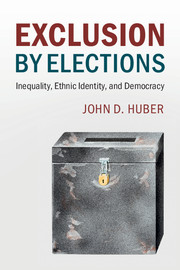PART I - THE THEORETICAL ARGUMENT
Published online by Cambridge University Press: 18 May 2017
Summary
I develop the theoretical argument in three chapters. Chapter 3 describes the distributive framework that is central to what follows. A central feature of electoral politics is “distributive” promises – that is, electoral commitments by parties to voters regarding who should benefit from government policy. But in such a framework, without something like group identity, it is very difficult for parties to make commitments that voters will view as credible. Ethnic and class identities can be very useful in addressing this problem parties face: these identities create a pathway by which parties can make credible commitments about government distribution, though a pathway that also constrains the types of promises that parties can make. By focusing on the nature of these constraints, we can gain insights into how social structure – and in particular the distribution of ethnic and class identities – should advantage and disadvantage particular types of parties.
Chapter 4 takes up the question of how social structure should map onto party strategies and voting behavior. If social structure confers advantage on parties that represent particular types of groups, what should we expect with respect to party competition? In particular, why should disadvantaged parties form if they know they are going to lose? And what influences the nature of electoral promises that parties make to voters? The argument in Chapter 4 emphasizes the interaction of rent-seeking and policy incentives of party leaders, and describes how if party leaders have both such incentives, we can expect a clear mapping from social structure to electoral and policy outcomes. In addition, the chapter takes up the question of “theoretical robustness.” Are the central intuitions about social structure robust to different assumptions about electoral law, the source of government revenues, and the number of groups? The game theoretic model on which the argument is based is found in the appendix to the chapter.
Finally, Chapter 5 moves from the abstract model of group size to testable arguments about the interaction of inequality and ethnic diversity. I take up the issue of whether it makes sense to treat the number of nonrich as exogenous, when in fact we might expect the government to determine through policy who benefits from redistributive policy.
- Type
- Chapter
- Information
- Exclusion by ElectionsInequality, Ethnic Identity, and Democracy, pp. 33 - 34Publisher: Cambridge University PressPrint publication year: 2017



